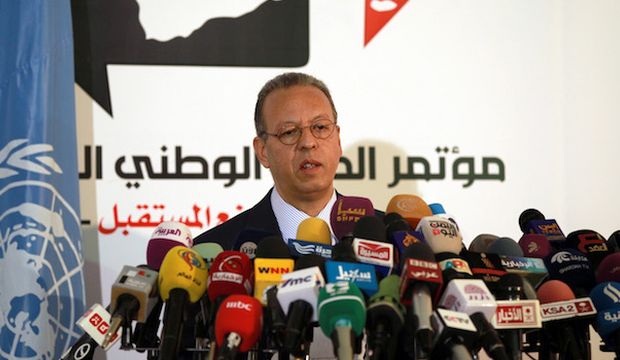
Jamal Benomar, the former UN special envoy to Yemen, speaks during a press conference in Sana’a, Yemen, on December 24, 2013. (AFP/Mohammed Huwais)
Riyadh, Asharq Al-Awsat—The rebuilding of the beleaguered Yemeni armed forces will be among the top priorities during an upcoming conference on Yemen due to take place in the Saudi capital Riyadh later this month, sources told Asharq Al-Awsat on Saturday.
The sources, who requested anonymity, said that in addition to focusing on Yemen’s political future, the conference would discuss “forming a new Yemeni national army that can operate at a high level and [whose ranks] are united.”
The Yemeni armed forces have been heavily criticized recently for not being able to block the advance of militias belonging to the Iran-backed Shi’ite Houthi movement, who began their spread across Yemen in September of 2014.
Members of the armed forces were seemingly powerless to stop the Houthi advance or abandoned their posts entirely, allegedly after receiving orders from commanders loyal to Yemen’s former president Ali Abdullah Saleh, who along with Iran is accused by Saudi Arabia, its Arab allies, and the UN of allying with the Houthis.
Speaking to Asharq Al-Awsat on Saturday, Abdulaziz Al-Jubari, the head of the committee tasked with organizing the Riyadh conference, said the list of attendees was close to being finalized and that the conference should encompass some 250 figures from Yemen’s different political factions.
He also revealed the conference would take place either on May 16 or 17.
Yemen’s Transport Minister Badr Baslama told Asharq Al-Awsat the conference would also discuss the formation of a wide political coalition involving as many of Yemen’s parties and factions as possible, as well as moves to put pressure on the Houthis to withdraw their militias from areas under their control.
He added that there have been ongoing discussions with members of former president Saleh’s General People’s Congress (GPC) party to this effect, as well as moves to completely ban the Houthi militias in future.
Meanwhile, an aide of Jamal Benomar, the UN’s special adviser on Yemen, who led previous failed attempts to convince the Houthis to withdraw their militias, revealed on Saturday further details to Asharq Al-Awsat regarding allegations of Benomar’s bias toward the Houthis during negotiations with them.
The aide, who requested anonymity, said Benomar had used “20 units from the Houthis’ militias to accompany him and provide security” during his visits to Yemen. This came at the same time the militias had stormed the presidential palace in the capital Sana’a and put Yemen’s legitimate and internationally recognized President Abd Rabbuh Mansur Hadi under house arrest.
The source also echoed previous allegations leveled at Benomar, saying the UN adviser was more concerned with securing any deal involving the Houthis without considering the long-term consequences for Yemen.
During the negotiations process Benomar also ignored envoys from Gulf states, preferring instead to meet with Iranian, US and British officials to discuss the crisis in Yemen, the source said, adding that the UN envoy completely eschewed the outcomes of the Gulf Initiative on Yemen, held the previous year, considering it “irrelevant” to the current circumstances in the country.
“Benomar’s reading of the situation was completely short-term and was not forward-looking. He was concerned only with securing a deal [with the Houthis] without considering the implications,” the source said, speaking to Asharq Al-Awsat via telephone.
“He did not realize that Yemen represented a red line with respect to the Gulf countries, and therefore totally did not expect a Saudi-led military operation in Yemen including other Gulf and Arab countries. He was totally surprised by Operation Decisive Storm.”
Benomar was also allegedly highly critical of President Hadi, whom the UN regards as representing the legitimate political authority in the country.
“[Benomar] repeatedly asked his publicists to deny several reports about his meetings with political factions in Yemen that were leaked to the Yemeni press. They included reports of his stinging criticisms toward President Hadi made during a closed-door meeting with 10 political figures in Sana’a, during which he accused the president of not heeding [Benomar’s] advice, thinking only of himself, and waking up late every day at three in the afternoon.”
Nayef Al-Rasheed contributed additional reporting from Riyadh.
